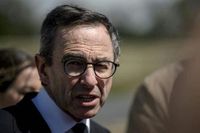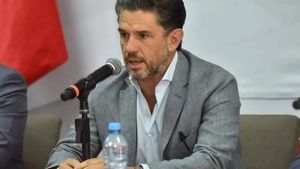In a recent series of statements, Bruno Retailleau, the French Minister of the Interior, has stirred the political pot by labeling the Rassemblement National (RN) as "very left-wing" on economic issues. His comments, made during an interview with CNEWS on April 15, 2025, have sparked a wave of reactions across the political spectrum, highlighting the ongoing tensions within French politics.
Retailleau's assertion comes at a time when the RN, led by Marine Le Pen, is attempting to redefine its image and appeal to a broader electorate. The party has historically been associated with right-wing populism, particularly on immigration and national identity. However, Retailleau's remarks suggest that he sees a shift in their economic policies that aligns more closely with leftist principles.
"I think the Rassemblement National is very left-wing, especially on economic issues," Retailleau stated emphatically during the interview. This statement raises questions about the RN's ideological positioning and its potential impact on the upcoming elections in France.
His comments are particularly significant in light of the recent legislative discussions surrounding end-of-life issues, which Retailleau has also criticized. He denounced a proposed legislation as a "text of abandonment," warning of its alarming consequences for vulnerable populations. This legislation aims to address complex ethical concerns regarding euthanasia and assisted dying, a topic that has been contentious in France for years.
Retailleau's dual focus on the RN's economic stance and the end-of-life legislation reflects a broader strategy to frame his party, The Republicans, as a defender of traditional values against what he perceives as the RN's opportunism. By positioning the RN as leaning left economically, he aims to undermine their credibility among conservative voters who may feel alienated by such a shift.
The RN has responded to Retailleau's claims, asserting that their economic policies prioritize the interests of the French people and challenge the establishment's status quo. In a statement, the party emphasized its commitment to national sovereignty and economic independence, which they argue are core components of their platform.
This political dynamic is further complicated by the backdrop of France's ongoing economic challenges, including rising inflation and public discontent over government policies. As the country prepares for the upcoming municipal elections in 2026, these issues are likely to play a critical role in shaping voter sentiment.
In Balaruc-les-Bains, local authorities are grappling with their own challenges, including a clandestine system linked to thermal waters that has raised health concerns. According to reports, this situation has prompted health authorities to take action to regain control over the management of these waters, which are vital for the town's economy and tourism.
As the political landscape in France continues to evolve, the interplay between local issues like those in Balaruc-les-Bains and national narratives, such as those articulated by Retailleau, will be crucial in determining the direction of both local and national politics.
In summary, Bruno Retailleau's provocative statements about the Rassemblement National's economic policies and his criticism of end-of-life legislation highlight the shifting dynamics in French politics. As parties prepare for future elections, the challenge will be to navigate these complex issues while maintaining voter trust and support.





